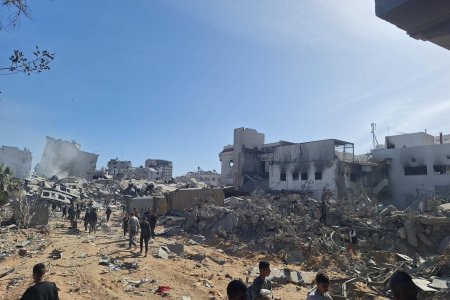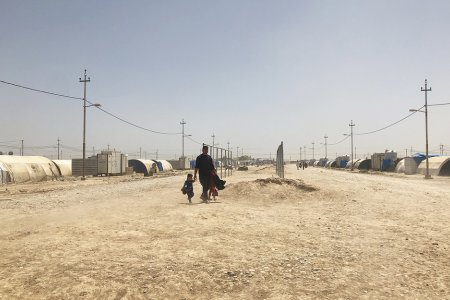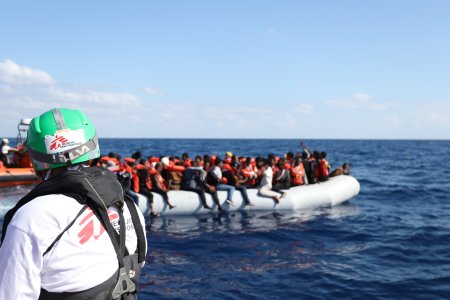War and humanitarianism, medicine and public health, rights and justice... Discover CRASH publications sorted by themes.
The fact that CRASH publications are written from an aid practitioner's, rather than researcher's, perspective, does not exempt them from the demands of rigorous research methods. We try hard at this, with the help of (volunteer) research professionals. The publications are not the MSF party line, but rather tools for reflexion based on MSF's framework and experience. They have only one purpose: to help us better understand what we are doing. Criticisms, comments and suggestions are more than welcome - they are expected.
 MSF
Video
MSF
Video
The Israeli-Palestinian conflict
04/16/2024Six months after the events of October 7, the situation in Gaza is catastrophic. The population is trapped and threatened with starvation, while the possibility of a ceasefire is not guaranteed. In this context, how can we describe what is happening in Gaza? Rony Brauman is categorical: it is appropriate to talk about genocide. In this interview conducted by Elba Rahmouni, he offers a historical and political reading of the Israeli-Palestinian conflict, looking at the reasons given by Israel to justify the siege of Gaza, the fate of prisoners and the usefulness of humanitarian law.
 Alain Fredaigue
Analysis
Alain Fredaigue
Analysis
The road from La Mancha: Narratives of failure and institutional reform
03/22/2024In this article, historian Eleanor Davey examines the concept of failure in the humanitarian sector through the experience of MSF and its reform process, known as La Mancha, which began in the early 2000s. The text highlights the challenges faced by MSF in recognising and resolving internal inequalities within the organisation.
 Candida Lobes
Analysis
Candida Lobes
Analysis
Crisis and Humanitarian Containment
12/19/2023Challenging the idea that humanitarian actors can act free from politics by virtue of their principles, this chapter argues that the politicization of humanitarian aid is in fact the primary condition for its deployment. Humanitarian actors can only act if they maintain a balance between their own interests and those of people in positions of power. This raises a crucial ethical question: At what point do humanitarian organisations consider that deals reached with political powers cross the blurred but very real line beyond which humanitarian assistance does more harm than good?
 Video
Video
Journal of Humanitarian Affairs : Volume 5 (2023), Issue 1 (Sep 2023): Humanitarian Numbers
11/23/2023On September 14th, 2023, the Journal of Humanitarian Affairs, the academic journal in open access, hosted jointly by the Crash, The Humanitarian Affairs Team at Save the Children UK (HAT) and the Humanitarian and Conflict Response Institute at the University of Manchester (HCRI), has published a new issue entitled “Humanitarian numbers”. The latter focuses on the technical aspect of numbers, dealing with two main questions: What datafication means? How well does the quantitative represent reality?
 Michaël Neuman
Opinion
Michaël Neuman
Opinion
In Cox’s Bazar
10/31/2023This article was published in the London Review of books website on September 8, 2023. The former evokes the dire conditions in which roughly 1 000 000 Rohingyas live in Cox’s Bazar, the largest refugee camp in the world. In this coastal district in south-east Bangladesh, the humanitarian deployment is impressive, but commitment by donors is waning. Between March and June, monthly food allocations fell from $12 to $8 per person. The difficulties of accessing care, the social control to which they are subjected and the lack of prospects are many reasons explaining the perils faced by the Rohingya population.
 Interview
Interview
Thinking on and beyond the concept of de-westernization
10/16/2023This interview by Didier Billion and Marc Verzeroli was originally published in the Revue internationale et stratégique. To examine the concept of de-westernization, Rony Brauman describes the current state of international relations, marked by fluid alliances and new power relationships. He states and details his reservations about whether universal values truly exist and how the international criminal justice system functions.
 MSF/Mohamad Cheblak
Analysis
MSF/Mohamad Cheblak
Analysis
A brief history of rescue operations in the Mediterranean
10/05/2023In Groupe URD's new issue of "Humanitaires en mouvement" (n°25), Michaël Neuman describes rescue operations in the Mediterranean and the strategies put in place by MSF to adapt to the constraints imposed by governments.
 Todd Brown
Interview
Todd Brown
Interview
Historicising Humanitarian Action. Synchronicity in Historical Research and Archiving Humanitarian Missions
06/30/2023The central question raised in this discussion relates to two profoundly intermeshed issues for humanitarian practitioners and organisations: the use of history for humanitarian organisations, and the need for them to preserve and maintain archives
 Mariana Abdalla/MSF
Analysis
Mariana Abdalla/MSF
Analysis
“We don’t do mental health”: a review of Médecins Sans Frontières’ first “psy” mission
06/05/2023This article was published on March 27th, 2023 in the journal Alternatives Humanitaires, in an edition focused on mental health.
